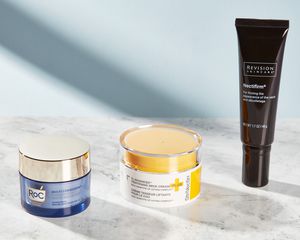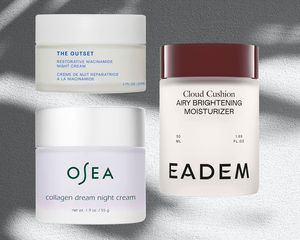:max_bytes(150000):strip_icc()/MagAlSil-155bda6854174651819b43ad18085c70.jpg)
Getty
Magnesium aluminum silicate may not be a skincare ingredient you've heard of, but it's highly likely that you're using it daily. The ingredient is a fan-favorite among cosmetic chemists, with a variety of different formulation benefits applicable across a wide array of personal care products. But as far as delivering actual skincare benefits? It doesn't really do much in that department. Ahead, board-certified dermatologist Marie Hayag, MD, founder of 5th Avenue Aesthetics in New York City, and Stacey Steinmetz, cosmetic biochemist and founder of StimuNail, explain why magnesium aluminum silicate is neither an ingredient you need to seek out nor try to avoid.
Magnesium Aluminum Silicate
Type of ingredient: A natural clay
Main benefits: It's used strictly for formulation purposes, including acting as an absorbent, emulsion stabilizer and helping to thicken products.
Who should use it: It hasn't been found to be irritating, so anyone can use it (unless you have an allergy to it), says Hayag.
How often can you use it: Magnesium aluminum silicate is found in many products that are used daily.
Works well with: Pretty much all other ingredients, which is why it's so often-used. Hayag adds that it plays especially nicely with other thickeners, such as cellulose gum and xanthan gum.
Don't use with: There are no ingredients known to interact negatively with magnesium aluminum silicate.
What Is Magnesium Aluminum Silicate?
"Magnesium aluminum silicate is a naturally occurring clay comprised of magnesium, aluminum, silica, and oxygen. The clay is then purified and refined to a powder that's used to improve the texture and function of cosmetic formulas," says Steinmetz. You'll find it in a wide range of beauty products across all categories, though she says it most often crops up in haircare products such as shampoo and conditioner, shower gels, lotions, makeup (foundations especially), and deodorant. Because it's a clay, it's also popular in vegan or plant-derived products, she points out.
Benefits of Magnesium Aluminum Silicate
The biggest takeaway here is that magnesium aluminum silicate is never used as an active or key ingredient in products, notes Steinmetz. "There are no studies that indicate that it has any sort of benefit for the skin," adds Hayag, who further underscores its sole use for formulation purposes. In that department, it offers a litany of benefits, which is why it's so popular. There's really not much it can't do. "By acting as an absorbent, it can help prevent clumping, but it's also an opacifying agent, which means it can be added to transparent formulas to make them resistant to visible light," Hayag explains. It thickens products and keeps them from separating (technical term: an emulsifier), and also helps suspend non-soluble particles such as color pigments or inorganic sunscreens such as zinc oxide or titanium dioxide, she adds. It can make products feel rich and creamy when applied, but again, it has no direct skincare benefits.
How to Use It
This ingredient does nothing for the skin, but it also isn't dangerous (more on that in a moment). In short, consider magnesium aluminum silicate to be totally inert; you don't need to really pay attention as to whether or not it's in your products.
Side Effects
Hayag says magnesium aluminum silicate is safe for anyone to use, as it hasn't been found to be irritating or sensitizing and has no known side effects. That being said, an allergy is still possible; Steinmetz points out that most often it's an allergy to the aluminum found in the ingredient. It also can cause some minimal eye irritation, she adds. According to The Cosmetic Database, the ingredient is considered safe for use in cosmetics and beauty products, though in limited concentrations; this again is because of those aluminum compounds, which do have some known risks associated with them, Steinmetz says. Still, that's not something that warrants concern. "Because magnesium aluminum silicate has very large molecules, it's unable to be absorbed into the skin and is unlikely to affect the endocrine, immune, or reproductive systems," explains Steinmetz.


